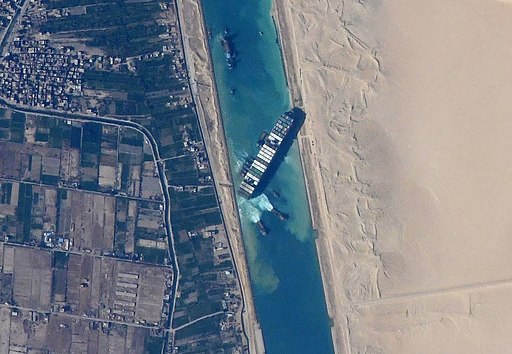To say 2021 has been an eventful year for the maritime industry would be an understatement. A lot has happened this past year; COVID-19, hurricanes, traffic jams and long lines at ports, as well as some new laws, have all had a big impact on the industry.
Here’s a review of some of the top maritime-related news stories of 2021:
The Ever Given Runs Aground in the Suez Canal
One of the biggest maritime disasters of 2021 didn’t result in major loss of life or injury, but the fallout was felt around the globe. On March 23, 2021, the vessel Ever Given, one of the largest cargo ships in the world, ran aground while traversing the Suez Canal.

The ship remained stuck in place until March 29, blocking the canal in both directions and causing a massive traffic jam that involved over 200 vessels. The delays cost shippers billions of dollars and affected supply chains around the world, causing shortages and raising prices on food, fuel, and manufactured goods.
Long Lines at U.S. Ports
Port congestion has been a major problem in 2021. Ports in Long Beach/Los Angeles, Houston, and Savannah have been plagued with delays unloading and loading incoming and outgoing vessels.
There are many reasons for the delays, including COVID-related staff shortages, record numbers of imported goods, and a lack of facilities in smaller ports to efficiently handle container cargoes. Proposed solutions include expanding to 24/7 operations and hiring more workers. The delays are resulting in product shortages and consumer inflation.
“Ocean Shipping Reform Act of 2021” Passed by the U.S House of Representatives
This year, the U.S. House of Representatives passed H.R. 4996, also known as the “Ocean Shipping Reform Act of 2021.” It represents the first major update of federal regulations for the global ocean shipping industry since 1998.
The purpose of H.R. 4996, according to the bill’s co-sponsor John Garamendi (D-CA), is to support American exports by establishing reciprocal trade opportunities to help reduce the United States’ longstanding trade imbalance with China and other countries. The bill, which passed the House with bipartisan support, will be taken up by the U.S. Senate in 2022.
Hurricane Ida strikes Louisiana
On August 29 (the 16th anniversary of Hurricane Katrina), Hurricane Ida made landfall near Port Fourchon, Louisiana. A Category 4 hurricane, Ida was the second-most damaging and intense hurricane (behind Katrina) to make landfall in the state of Louisiana.
Ida caused massive amounts of damage, including devastating the town of Grand Isle. Many vessels were damaged after being torn from their moorings, run aground, or sunk by the force of the storm. It was also one of the costliest storms in terms of damage; Ida caused over $18 billion in damages in Louisiana alone.
The Maritime Industry Continues To Deal With the COVID-19 Pandemic
COVID-19 continues to have a serious effect on the maritime industry. While the passenger transport segment, including the cruise industry and ferry services, continue to be affected by the pandemic, the industry’s largest markets — including containers, tankers, and bulkers — have made a strong recovery.
Seamen working on vessels continue to face pandemic-related hardships, such as lockdowns, quarantines, and travel and port restrictions. The bottlenecks in many ports are only making things worse. These circumstances are raising international humanitarian concerns about the mental and physical safety of mariners stuck onboard vessels.
Vaccination rates are up, but there are still numerous cases of COVID-19 among maritime workers. How the recent outbreak of the Omicron variant affects the maritime industry remains to be seen.
The Seacor Power Capsizes in the Gulf of Mexico
On April 13, the Seacor Power, a liftboat owned by Seacor Marine, capsized in the Gulf of Mexico several miles south of Port Fourchon Louisiana due to high winds and rough seas. 19 crewmen were on board when the vessel went down; six crewmen died, six crewmen were rescued and seven remain missing. The accident is still under investigation.
The Lambert Firm is representing Yvette Ledet, widow of Captain David Ledet, in a lawsuit against Seacor Marine and Talos Energy.
Thousands of Gallons of Oil Leaked into Water off Huntington Beach, California
An Oct. 1 leak from a pipeline off Huntington Beach in California released 25,000 gallons of oil into the water off Orange County. Oil was found across Newport Beach, Laguna Beach and Huntington Beach, killing fish and birds and threatening ecologically sensitive wetlands, as well as hurting local businesses that depend on the local water and beaches.
The leak is suspected to have been caused by a ship’s anchor dragging across and cracking the pipeline.
Offshore Wind Farm Workers Are Now Protected Under the Outer Continental Shelf Lands Act
The National Defense Authorization Act for FY202 contained several amendments pertaining to the maritime industry, including financial relief for U.S. seaports, new rules for passenger vessel safety, and new language that brings offshore wind farms under the jurisdiction of the Outer Continental Shelf Lands Act (OCSLA), just like offshore oil and gas facilities.
The Lambert Firm Has Been Protecting the Rights of Injured Maritime Workers Since the 1970s
If you’re a maritime worker who’s been injured in an on-the-job accident caused by negligence or human error, the Jones Act and other maritime law give you the right to seek compensation for the damages caused by your injuries. The Lambert Firm has been protecting the rights of injured maritime workers since the 1970s. Our team of highly experienced maritime injury attorneys has obtained hundreds of millions of dollars in cash settlements for our clients.
Contact The Lambert Firm online or call us at (800) 521-1750 to discuss your maritime injury case.







